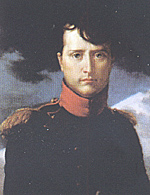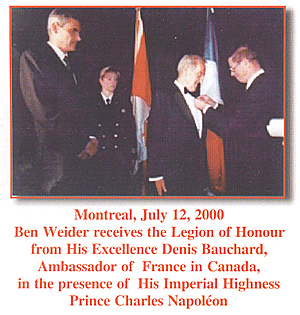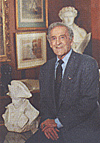Napoleon Bonaparte
A Few Accomplishments
by Ben Weider, CM, CQ, SBStJ, Ph.D, Canada
| |
Napoleon created the Bank of France in 1800, and after six years of varied experiments, gave it its official status by law on April 22, 1806. The Napoleonic Code (Code civil) This is a code of laws designed to define the relationship between the members of one family and the citizens of the nation. Napoleon presided over the majority of working sessions. He astonished the most distinguished jurists by the pertinence of his remarks and his knowledge of the law, including that of ancient Rome. One day, he came to the aid of an eminent jurist who was searching his papers for a text on the Institutes of Justinian, by reciting the entire quotation by heart. Liberty and equality were the principles that Napoleon advocated for the drafting of each of the 2281 articles of the code. Without him, the jurists would have lost themselves in endless discussion. The final version of the Napoleonic Code became law on March 21, 1804. This code has been copied in countries the world over and most of its provisions are still in force today. The Commercial Code Introduced on April 3, 1801, the final version was adopted in 1807. Napoleon was then far from Paris, defending France against the attacks of the fourth coalition, (England, Prussia, Russia). After his victories at Iena, Auerstädt, Eylau and Friedland and his meeting with Tsar Alexander at Tilsit (treaty of July 7, 1807), he returned to St. Cloud on July 27, 1807. The very next day, July 28, he presided over the work of the commission of the Council of State charged with drafting the final version of the Commercial Code. During the three other sessions over which he presided on July 29 and August 1 and 8, he accelerated the progress of affairs, and the various laws were enacted in September, 1807. The Criminal Code This code was introduced in 1801 and completed in 1808. The juge d’instruction (examining magistrate) made his appearance for the first time. He is still there today, and has so much power that he can examine even the most important figures of State. The Penal Code The Penal Code of 1810 has survived in its essential form and has retained a strong influence of the legislation of most of the countries of the world. The Civil Procedure Code This was designed to complement the Civil Code in every matter concerning the application of laws. The Napoleonic University Upon his accession to power, Napoleon threw himself wholeheartedly into the organization of public education, which at that time was highly neglected. In 1800, 75 percent of French people could neither read nor write. Primary Education He put the prefects of the departments in charge of creating primary schools in the towns and villages to ensure that all children would learn reading, writing, arithmetic, history, geography, and general moral principles. The Primary Studies Certificate was awarded at the age of 12 at the end of this level of studies. Secondary Education Napoleon created the lycée system. There were already a hundred or so lycées in France in 1802, and 160 by 1804. He created the baccalauréat in the form in which it exists today: the examination that crowns a successful program of secondary studies. Higher education Napoleon created the Faculties with their schools of law, medicine science and mathematics. He promoted the rise of the Grande écoles such as the Polytechnic. Upon assuming responsibility for governing Belgium, Holland and Italy, he also extended the benefits of this educational system to those countries. Freedom of Worship The Revolution had caused untold harm to the practice of religion by destroying churches, temples and synagogues and imprisoning and massacring ministers, priests, pastors and rabbis. Napoleon re-established total freedom of worship. “God, he said, belongs to each of us in accordance with our conscience.” Although he was surrounded by atheistic revolutionaries, he straight away attacked the problem of the freedom of worship in the Catholic faith, which was the religion of the great majority of French people. The Concordat (the most difficult thing I have ever accomplished, he was later to say) The new Pope, Pius VII, was elected in March 1800. On June 25, 1800 (11 days after his victory of Marengo over the Austrians), Napoleon sent Cardinal Martiniana to ask for an audience with him to study the conditions for re-establishing freedom of worship, in full agreement with the papacy. The Concordat was signed a year later after numerous difficulties were overcome thanks to the firmness but also the conciliatory genius of the First Consul. He began by making a friend of the abbé Bernier, who until that time was the leader of the revolt of Catholics of the Vendée against the prohibitions issued by the Directory government. Bonaparte, with all the sincerity and charisma so typical of his personality, had no trouble convincing Bernier that they should work together hand in hand for the greater good of the people. With one stroke, he brought an end to a Civil War that the atrocious repression of previous governments had only succeeded in exacerbating. Now an ally, hard-liner Bernier brought his priestly support to the various phases leading up to the agreement. 1st phase: Cardinal Spina, the Pope’s envoy, comes to Paris. 2nd phase: A project is sent to Rome with an excellent diplomat by the name of Cacault. The affair drags on because of the delaying tactics of the Pope's ministers. On May 12, 1801, Napoleon issues an ultimatum, but no one in the Quirinal wants to give in. 3rd phase: Cacault returns to Paris with the Pope’s Secretary of State, Cardinal Consalvi. He is in fact the second most powerful man in the hierarchy of the Roman Catholic Church and has been granted the power of decision by the Pope. Napoleon, who intervenes personally in the debate, manages after bitter discussion to make him accept the final version, which will be signed by the Pope on July 15, 1801. The document cancels the anti-religious edicts of the Revolution
N.B. It wasn’t until 1905 that the law separating Church and State was passed. The Great Sanhedrin Until 1800, the Jews had been persecuted and harassed for centuries all over Europe. Napoleon strove to restore their dignity, as the Encyclopédie judaïque relates:
Napoleon's greatest influence on Jewish history occurred in the years 1806-1808, when he reunited the Great Sanhedrin in Paris (for the first time in almost 2000 years). Napoleon made the Jews full-fledged citizens of the countries where they resided, levelled the ghettos, did away with the yellow star and promoted the construction of synagogues. Metternich, who was Austrian ambassador to Paris, wrote to his Emperor in September 1806: “All the Jews see Napoleon as their Messiah.” There can be no doubt that the Napoleonic laws constituted the turning point that permitted the Jews to accede to free society as it exists today. By making Judaism the third official faith, the Great Sahedrin of 1807 has for the Jews the same importance as the Concordat for Christians. This prayer was recited at all the synagogues and had been written spontaneously:
“I implore the eternal Creator of heaven and earth and of all living things ....... How truly happy we are, how agreeable is our fate, since now thou hast placed Napoleon the Great on the thrones of France and Italy… Oh God, lord of greatness, strength, power and beauty, we implore thee to stay ever by his side..... oblige his enemies to ask for peace, for all he desires is peace among all nations…”
On May 19, 1802, the First Consul created the order of the LEGION D’HONNEUR that bore the device “HONOUR and COUNTRY.” The most brilliant Frenchman from both civilian and military life will be reunited in a single élite Legion whose example will guide the nation. Montreal, July 12, 2000 Ben Weider receives the Legion of Honour from His Excellence Denis Bauchard, Ambassador of France in Canada, in the presence of His Imperial Highness Prince Charles Napoléon. The first ceremony to confer the Legion of Honour took place on July 15 1805 in the Cour des Invalides. The Emperor personally bestowed the medal to all the recipients: marshals, high dignitaries, even a soldier of Napoléon’s old guard, Jean-Roch Coignet. The prestige of the Legion of Honour, which was subsequently conferred on a number of illustrious foreigners, is such that practically all the orders that have since been created the world over have used it as a model. One of the first foreigners to receive the decoration was the great German writer, Johann Wolfgang von Goethe. I personally received it on October 12, 2000 from the hands of His Excellency, Denis Bauchard, French Ambassador to Canada. The Stock Exchange In the great cleanup campaign that the First Consul undertook upon coming to power at the end of 1799, he first had to attend to the most pressing business: to ensure the proper functioning of the treasury department. It was only after 1802, when he had obtained external peace by the treaties of Lunéville and Amiens, and internal peace by the Concordat, that he was able to reorganize the financial and commercial markets by regulating the stock markets. Bonaparte’s ideas were simple, and as in every domain, bore the seal of common sense.
He created stock exchanges in all the great cities, with a precise set of rules that guaranteed the proper running of businesses while limiting abuses. It was also Napoleon Bonaparte who oversaw the construction of the Paris Stock Exchange that exists to this day. The Court of Audit The decree ordering the creation of the Court of Audit was signed by the Emperor on September 18, 1807. The court included one senior magistrate, three ordinary magistrates, 18 masters of accounts, 24 first class and 60 second-class auditors, one attorney general, and one senior registrar. The court’s mission was on the one hand, to examine the receipts of the receivers general in the departments and the regulation and administration of all indirect contributions; and, on the other, to examine the expenses of general paymasters, and army, military division and department paymasters. Canals In 1800, France had 1000 kilometres of canals. By 1814, Napoleon had understood perfectly the economic importance of river traffic; 1890 additional kilometres were completed or under way.
Furthermore, major improvement work was carried out on rivers, particularly the Seine, the Marne, the Aube, the Yonne and the Aisne. This primarily involved maintaining and repairing embankments and towpaths. Ports Napoleon ordered immense constructions that considerably changed the appearance and increased the capacities of the ports of Anvers, Brest and Cherbourg, where he had a great dike constructed. In addition, practically every port under his control, from Italy to Holland, benefited from some useful development, both for the merchant marine and the Navy. Roads Napoleon made enormous efforts to improve and extend the road network. From 1800 to 1814, thousands of kilometres of roads were constructed or improved. The decree of December 16, 1811, which defines the classification of the Imperial roads, gives an idea of his accomplishments. There were 14 first-class roads. The most important of these were:
Also worth mentioning are the three routes constructed through the Alps. These are the Simplon, Mont-Cénis and Mont-Genèvre Passes. Urban Development Napoleon’s accomplishments in the area of urban development greatly improved the surroundings and living conditions of city dwellers. In 1800, whole city neighborhoods were still in the unhealthy condition of the Middle Ages. The streets had a central ditch in which excrement and pestilential waste accumulated. By 1814, this was a thing of the past. It can be truly said that it was Napoleon who brought the cities from the Middle Ages and into modern times. Every city benefited from his decisions, the purpose of which were both hygienic and aesthetic. The plan was extended throughout France and the Empire, most notably in Bordeaux, Lyon, Lille, Marseilles, Rome and Venice. But it was above all in Paris that his greatest feats of urban development were accomplished. Napoleon wanted the most beautiful capital at the world and he got it. Assisted by the best architects and engineers, he defined wide thoroughfares and eradicated unhealthy neighbourhoods. Among his realizations should be noted the rue de Rivoli - as straight as an arrow – that follows the line of the garden of the Tuileries with wide sidewalks and arcades offering shelter against the weather. This same architectural order was applied to the rue des Pyramides and rue Castaglione, which together with the rue de Rivoli and the rue de la Paix, formed a first-rate monumental ensemble whose centre is formed by the Place Vendôme, with its column erected to the glory of the Grande Armée. We owe to the Emperor the system of plaques bearing street names and house numbers on plaques (even numbers on one side and odd on the other); a system that was copied throughout Europe. It was also Napoleon who decided the shape of the pavement, slightly convex with gutters along the edges next to the sidewalks. The organization of the water services was one of the masterpieces of Napoleon’s plan to provide Parisians with healthier, better living conditions. In 1800, the overwhelming majority of the population was still dependent on the costly services of water carriers. Napoleon ordered the construction of hundreds of drinking water fountains, most of which were installed in the most elegant monuments. It is also to Napoleon that we owe:
Napoleon was the first French sovereign to truly and consistently occupy himself with Paris. His enormous positive achievements, carried out in only 15 years, are deserving of all our admiration and gratitude.
|
 The Bank of France
The Bank of France The Legion of Honour
The Legion of Honour Books from the same author
Books from the same author